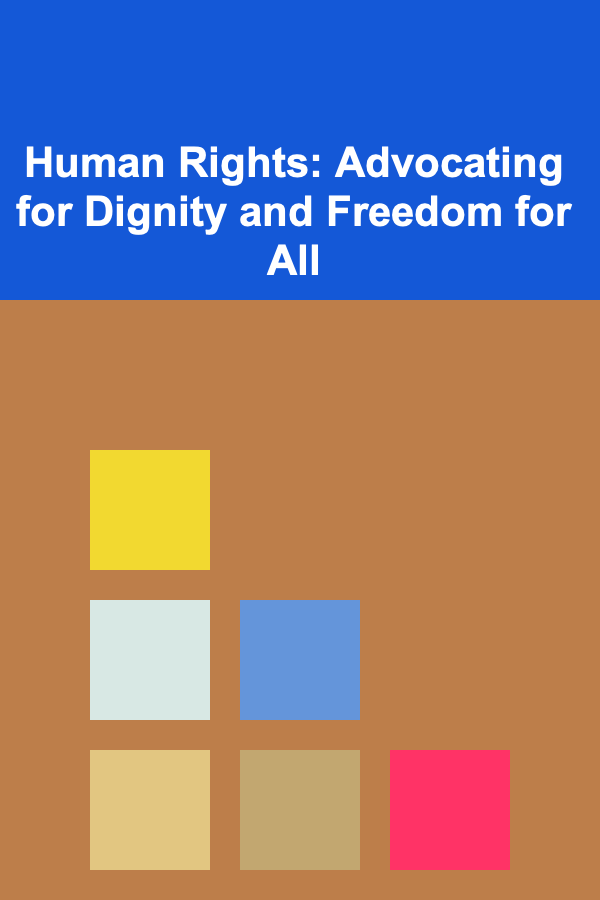
Human Rights: Advocating for Dignity and Freedom for All
ebook include PDF & Audio bundle (Micro Guide)
$12.99$10.99
Limited Time Offer! Order within the next:

Human rights form the cornerstone of a fair and just society. The concept that every individual is entitled to certain rights and freedoms by virtue of being human is fundamental to maintaining peace, equality, and justice across the globe. Despite their universal nature, the struggle for human rights continues to be a pressing issue in many parts of the world. This guide explores the concept of human rights, why advocating for them is crucial, and actionable steps that can be taken to ensure dignity and freedom for all.
The Importance of Human Rights
Human rights are the basic rights and freedoms to which all individuals are entitled, regardless of nationality, ethnicity, religion, gender, or any other status. They are inherent to all human beings and are not granted by governments but rather recognized as inalienable. These rights include the right to life, liberty, equality before the law, freedom of speech, the right to education, and the right to participate in the cultural, social, and political life of one's community.
The Universal Declaration of Human Rights (UDHR), adopted by the United Nations General Assembly in 1948, serves as the foundational international document enshrining human rights. Its 30 articles encompass various rights and freedoms that protect individuals from oppression, exploitation, and discrimination. Human rights transcend borders, and advocating for them is essential to ensuring that every person, no matter where they live, is treated with dignity and respect.
However, despite the widespread recognition of human rights, millions of people continue to experience violations. From authoritarian regimes to societal inequalities, human rights abuses remain pervasive. Advocating for human rights is not merely a moral duty but a critical necessity for building a just and peaceful world.
The State of Human Rights Globally
While many countries have made strides in safeguarding human rights, violations continue in various forms. Common human rights issues include:
1. Political Repression
In many parts of the world, individuals are denied the right to freely express their political beliefs, participate in free elections, or even assemble peacefully. Governments in authoritarian regimes often silence dissenting voices through censorship, imprisonment, or violence.
2. Discrimination
Discrimination based on race, gender, sexual orientation, religion, and disability is a major issue in numerous societies. Women and girls, in particular, face significant barriers to equality, often being denied access to education, employment, or basic healthcare services.
3. Freedom of Speech
The right to speak freely is a fundamental human right, yet censorship remains a global issue. In some countries, journalists, activists, and everyday citizens are silenced for speaking out against injustices or government actions.
4. Access to Education
Millions of children and adults around the world are denied access to education due to poverty, war, and discriminatory practices. Education is a fundamental human right that empowers individuals to improve their lives and contribute meaningfully to society.
5. Refugees and Migrants
Forced displacement due to war, persecution, or natural disasters leads to a significant refugee crisis worldwide. Refugees often face significant challenges in accessing basic rights such as safety, healthcare, education, and employment opportunities.
6. Economic Inequality
Economic inequality often intersects with human rights violations, as those in poverty face barriers to healthcare, education, and decent living conditions. This inequity can lead to a cycle of marginalization and disenfranchisement.
The Role of Human Rights Advocacy
Advocacy for human rights is an essential component in the global struggle for justice and dignity. By raising awareness, influencing policies, and providing support to marginalized groups, human rights activists play a vital role in the protection and promotion of human rights worldwide. Effective advocacy involves not only speaking out against abuses but also mobilizing individuals, governments, and international organizations to take action.
Here are several key roles that human rights advocates can play:
- Raising Awareness: Education and awareness are fundamental to human rights advocacy. Many people are unaware of the struggles others face, and spreading information about human rights abuses is often the first step toward change.
- Empowering Affected Communities: Advocacy should focus on empowering individuals and communities to claim their rights. This involves supporting grassroots organizations, providing legal assistance, and advocating for local policy reforms.
- Holding Governments and Corporations Accountable: Governments and corporations must be held accountable for violating human rights. Advocates play a key role in pushing for accountability through legal channels, public pressure, and international organizations like the United Nations.
- Building Global Networks: Human rights are a global issue, and building coalitions and networks across borders is crucial for effecting change. International organizations, non-governmental organizations (NGOs), and grassroots movements often collaborate to push for global policies that protect human rights.
- Mobilizing Public Action: Public campaigns, protests, petitions, and advocacy events are powerful tools for raising visibility and demanding action on human rights issues. Mass mobilization can create pressure on policymakers to implement reforms.
Actionable Steps for Advocating Human Rights
Advocating for human rights requires dedication, empathy, and a willingness to stand up for those whose voices are often silenced. While the challenges are significant, there are actionable steps individuals and organizations can take to make a tangible difference:
1. Educate Yourself and Others
The first step in advocating for human rights is understanding the issues at hand. Educate yourself about the various human rights violations occurring worldwide and understand the context behind them. Read books, attend seminars, and follow trusted human rights organizations like Amnesty International or Human Rights Watch. Once you're well-informed, share this knowledge with others in your community, whether through discussions, social media, or public speaking events.
2. Support Human Rights Organizations
Many organizations are working tirelessly to combat human rights violations, from providing legal aid to victims to lobbying for policy changes. You can support these organizations by donating, volunteering, or amplifying their work. Some prominent organizations include:
- Amnesty International
- Human Rights Watch
- International Federation for Human Rights (FIDH)
- The United Nations Human Rights Council (UNHRC)
3. Advocate for Policy Change
Advocacy often involves lobbying for changes to laws or government policies. Whether it's campaigning for stronger protections for refugees or pushing for anti-discrimination laws, it's essential to engage with lawmakers and policymakers. Write letters, start petitions, or even participate in campaigns that aim to influence policy decisions.
4. Engage in Direct Action
Protests, demonstrations, and social movements are essential components of advocating for human rights. When oppressive governments or entities violate human rights, people often turn to direct action to demand justice. This can take the form of peaceful protests, strikes, or online campaigns. Joining or organizing such events can amplify calls for action and put pressure on authorities to make changes.
5. Promote Fair Trade and Ethical Consumption
Human rights abuses often occur in the context of exploitative labor practices. By supporting fair trade products, you can help ensure that workers are paid fairly, treated ethically, and provided with safe working conditions. Look for products labeled as Fair Trade certified, which ensures that companies adhere to ethical standards.
6. Raise Awareness through Social Media
In the modern age, social media is an incredibly powerful tool for raising awareness and mobilizing action. Share information about human rights issues, support campaigns, and participate in online discussions. Use hashtags to bring attention to specific human rights issues (e.g., #BlackLivesMatter, #MeToo, #StandUp4HumanRights).
7. Support Refugees and Migrants
With millions of displaced people seeking safety, it's crucial to show solidarity with refugees and migrants. Volunteer with organizations that assist refugees, donate supplies, or offer support in your community. Advocate for policies that provide humanitarian aid and protect displaced individuals.
8. Challenge Discrimination in Your Community
Stand up against discrimination in your daily life. Whether it's racial, gender, or any other form of discrimination, take a stand and encourage others to do the same. Support initiatives that promote inclusivity and diversity, and be an ally to marginalized groups.
Conclusion
Human rights are the foundation of a just and fair world, yet they remain under threat in many regions of the globe. By understanding the issues at hand and actively advocating for dignity and freedom, we can create a world where everyone is afforded the rights they are entitled to. The fight for human rights is ongoing, and each one of us has a role to play in ensuring that dignity and freedom are protected for all.
Through education, awareness, advocacy, and collective action, we can hold governments and corporations accountable, empower marginalized communities, and foster a society that truly values human rights. The work is not easy, but the reward---a world where every individual's rights are upheld---is worth the effort.

How to Choose Furniture that Encourages Relaxation
Read More
How to Keep Your Pet Comfortable During Cold Weather
Read More
How to Manage Transportation Logistics for Field Trips
Read More
How to Renovate Your Home's Entryway for a Grand First Impression
Read More
How to Set Up a Lease Agreement for a Home Rental Property
Read More
Monetizing Deep Learning: Creating AI Tools for Ongoing Revenue
Read MoreOther Products

How to Choose Furniture that Encourages Relaxation
Read More
How to Keep Your Pet Comfortable During Cold Weather
Read More
How to Manage Transportation Logistics for Field Trips
Read More
How to Renovate Your Home's Entryway for a Grand First Impression
Read More
How to Set Up a Lease Agreement for a Home Rental Property
Read More